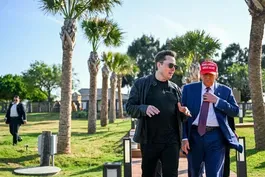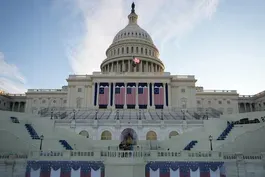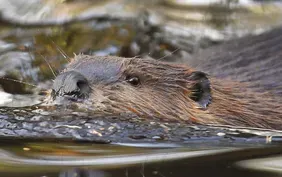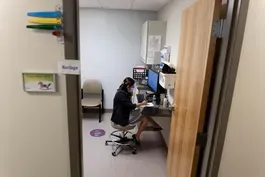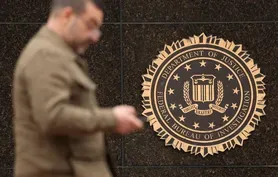
'Poet of Havana' uses music to address pain of politics
Clip: 2/6/2025 | 9m 1sVideo has Closed Captions
'Poet of Havana' uses his music to address pain caused by politics
As Cuba stands to become even more isolated, many Cubans continue to leave and those who stay remain cut off from family in the United States. Carlos Varela, a singer known as “The Poet of Havana,” has been addressing the pain politics causes. Jeffrey Brown reports from Havana for our series, Art in Action, exploring the intersection of art and democracy and our arts and culture series, CANVAS.
Major corporate funding for the PBS News Hour is provided by BDO, BNSF, Consumer Cellular, American Cruise Lines, and Raymond James. Funding for the PBS NewsHour Weekend is provided by...

'Poet of Havana' uses music to address pain of politics
Clip: 2/6/2025 | 9m 1sVideo has Closed Captions
As Cuba stands to become even more isolated, many Cubans continue to leave and those who stay remain cut off from family in the United States. Carlos Varela, a singer known as “The Poet of Havana,” has been addressing the pain politics causes. Jeffrey Brown reports from Havana for our series, Art in Action, exploring the intersection of art and democracy and our arts and culture series, CANVAS.
How to Watch PBS News Hour
PBS News Hour is available to stream on pbs.org and the free PBS App, available on iPhone, Apple TV, Android TV, Android smartphones, Amazon Fire TV, Amazon Fire Tablet, Roku, Samsung Smart TV, and Vizio.
Providing Support for PBS.org
Learn Moreabout PBS online sponsorshipAMNA NAWAZ: As Cuba stands to become even more isolated, many Cubans are leaving.
By one estimate, there's already been a 10 percent drop in population in recent years, though actual numbers are likely higher.
Those who stay on the island are essentially cut off from family in the United States.
Singer Carlos Varela, known as the Poet of Havana, has spent decades putting the pain of that political divide into song.
Here's senior arts correspondent Jeffrey Brown, with his second report from Havana for our series Canvas and Art in Action, exploring the intersection of art and democracy.
JEFFREY BROWN: One word says nothing, sings Carlos Varela, but at the same time, it hides everything.
A renowned and beloved Cuban singer-songwriter, Varela is a master of imagery and language, singing words as in one of his best-known songs, "Una Palabra," that have spoken loud and clear, if often through metaphor and poetry, to several generations of Cubans.
CARLOS VARELA, Musician (through translator): It's a mystery.
But the power of words, the power of a verse, the power of a song, the power of a book, that's a blessing, because words can transform.
They can reach your soul and your heart.
They can shake your bones.
They can change your life, and that can't be lost.
JEFFREY BROWN: We recently joined Varela as he rehearsed at his Havana home studio and talked about his unusual life in music, a star in a country he loves, but has often been at odds with.
CARLOS VARELA (through translator): I have dedicated myself to know the problems of my people, because, for me, songwriting is not a job.
It's therapy.
If I don't write songs, I go crazy.
So this is my way of saying all that I feel based on what I see, read and hear.
The story has always been, like in my generation and dissatisfied youth, it's constantly questioning things.
JEFFREY BROWN: Born in 1963 and raised in Havana, his first love was theater.
But, in his 20s, he turned to music, to Nueva Trova, a Cuban genre of folk singer-songwriters that emerged in the 1960s and addressed social issues.
He learned from and was embraced by Cuban stars such as Silvio Rodriguez and Pablo Milanes.
Varela was part of a post-revolutionary generation that experienced the full brunt of the so-called Special Period of the 1990s, after the dissolution of the Soviet Union and end of the support it provided Cuba, leaving his country in near economic collapse.
Living in a one-party communist regime still run by the heirs of Fidel Castro, he sung of both the country's beauty and promise, but also its problems, a dissent not directly political, but there for all to hear.
CARLOS VARELA (through translator): What really amazes me is that so many people find their voice through my songs.
But, to be honest, I did not write them with that purpose.
So my songs almost always ask questions.
No?
Why?
To when?
Why not?
JEFFREY BROWN: Do you see yourself as a political songwriter?
CARLOS VARELA (through translator): No, I don't like politics and I also don't like politicians.
Politicians should all be on Animal Planet.
But I do have societal concerns.
Therefore, they are political.
And that's why for 43 years I have written songs that make politicians uncomfortable in Cuba and outside of it.
I agree with Bob Dylan when he says he's not interested in spreading one message only.
That's how I think.
JEFFREY BROWN: Through the years, Cuban authorities have regularly banned his music from the radio and kept him from performing.
His last large public concert in 2022 came after mass protests a year earlier were quickly put down.
At the concert, chants of "Freedom" were heard in the audience.
CARLOS VARELA (through translator): I didn't ask them to shout, but I'm also not going to ask you not to shout.
Be free.
And that evidently didn't sit well with the politicians.
JEFFREY BROWN: The beauty of his music, the power of his songwriting, have captured younger generations, including 26-year-old keyboard player Rodrigo Garcia.
RODRIGO GARCIA, Musician: Sometimes, the people were just thinking, how is he telling those things in the songs?
And the people were like, wow.
I was in a lot of concerts of Carlos, and it was amazing, because thousands of people knowing the songs, but at the same time they were just waiting to say what the songs were saying.
JEFFREY BROWN: He was expressing what they were feeling.
RODRIGO GARCIA: Yes.
JEFFREY BROWN: Varela has been championed by American musical stars, including Jackson Browne, who recorded a translated version of Varela's song "Walls and Doors."
They performed together in Havana in 2015.
He's performed in this country sporadically, including on PBS "Live From Lincoln Center," "Seasons of Cuba" with violinist Joshua Bell, where he sang "Walls and Doors" with Dave Matthews.
But he's also been denied visas, caught in the middle of U.S.-Cuban political strife and travel restrictions.
In 2009, guitar in hand, he even lobbied on Capitol Hill for more open relations.
Today, he says this: CARLOS VARELA (through translator): While politicians can or can't come to an agreement, Cuban and U.S. artists and writers can achieve what the politicians haven't been able to in 60-something years.
That's what "Walls and Doors" is about.
And in my song, there's a verse that says, "And, still, the grandparents from both shores cast their bait, the blame, and the seed."
And we all know that in these 60-something years, many people have profited from the industry of hatred to make money.
The worst thing is that the people are the ones who pay for all the blame.
JEFFREY BROWN: In his song "Foto de Familia," or "Family Photo," Varela mourns the broken Cuban family and individual families split by those who left and those who remain behind.
In recent years, migration from the island has accelerated, driven by a teetering economy, soaring inflation, and the loss of tourist dollars with renewed U.S. restrictions on travel to the island.
CARLOS VARELA (through translator): I love my country deeply, and I deeply love the generations that lived with me in my country.
It pains me deeply to see how so many, so many friends leave every day, going away searching for a possible uncertain future.
This is also what my songs talk about.
This could be a wonderful, prosperous country simply by opening the doors and opening the soul and the individual freedom of all Cubans to develop all their talent in their own land.
For that to happen, many dinosaurs must disappear.
JEFFREY BROWN: Is the idea or the hope of democracy here in Cuba possible?
Is it just a dream?
CARLOS VARELA (through translator): It's a dream, but not only is it possible.
It's necessary.
All human beings have different thoughts, and there's no perfect society.
But neither is the Cuban one, with a single party, a single opinion.
If you don't think like me, then you might go to prison.
No, a society has to develop based on the diversity of opinion, of criteria.
Of course, democracy in Cuba is possible.
It can be.
I have faith, and I dream that it will be, and I hope it's very soon.
JEFFREY BROWN: Carlos Varela sang for us one of his signature songs, "Habaname," "My Havana."
"Havana, Havana, if only a song were enough to give you back everything that time took from you."
For the "PBS News Hour," I'm Jeffrey Brown in Havana, Cuba.
Deadline for federal workers to resign delayed by judge
Video has Closed Captions
Deadline for federal workers to resign delayed as Democrats step up fight against Musk (3m 32s)
Democracy advocate examines Trump changes to government
Video has Closed Captions
Democracy advocate examines how Trump is changing the U.S. government (7m 22s)
Engineers turn to beavers for insights into managing water
Video has Closed Captions
Why engineers are turning to beavers for insights into managing water resources (7m 39s)
Funding freeze impacts community health, Head Start programs
Video has Closed Captions
How the federal funding freeze is impacting community health and Head Start programs (6m 35s)
GOP Sen. Schmitt says 'FBI ripe for real reform'
Video has Closed Captions
GOP Sen. Schmitt says 'FBI ripe for real reform' and Patel has the experience to do it (7m 8s)
News Wrap: Panama's president rejects U.S. canal fee claim
Video has Closed Captions
News Wrap: Panama's president rejects U.S. claim of canal transit fee deal (4m 38s)
Trump working to dismantle efforts to fight climate change
Video has Closed Captions
Trump aggressively working to dismantle U.S. efforts to fight climate change (5m 53s)
Providing Support for PBS.org
Learn Moreabout PBS online sponsorshipMajor corporate funding for the PBS News Hour is provided by BDO, BNSF, Consumer Cellular, American Cruise Lines, and Raymond James. Funding for the PBS NewsHour Weekend is provided by...

